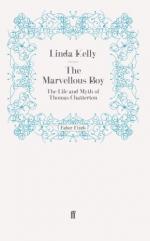|
This section contains 7,315 words (approx. 25 pages at 300 words per page) |

|
SOURCE: “Thomas Chatterton Was a Forger,” in The Yearbook of English Studies: Eighteenth-Century Lexis and Lexicography, edited by Andrew Gurr, Vol. 28, 1998, pp. 276-91.
In the following excerpt, Groom tries to define forgery in light of the Rowley manuscript controversy that occurred after Chatterton's death; in his discussion, Groom focuses on the complex debate concerning the difference between history and fiction and the importance of authorial intention in deciding whether a document is indeed a forgery.
At that point Don Giuseppe would explain to him at length how the work of the historian is all deception, all fraud; how there was more merit in inventing history than transcribing it from old maps and tablets and ancient tombs; how, therefore, in all honesty, their efforts deserved an immensely larger compensation than the work of a real historian, a historiographer who enjoyed the benefits of merit and status.
‘It's all fraud...
|
This section contains 7,315 words (approx. 25 pages at 300 words per page) |

|


